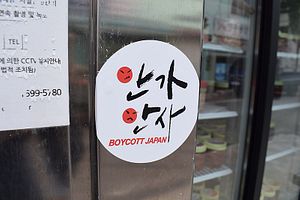Officials and business leaders from Japan and South Korea met in Tokyo on Friday seeking to cool a flare-up in tensions between the two U.S. allies.
The head of Japan’s powerful Keidanren business group, Hiroaki Nakanishi, said that businesses could help bridge differences that have taken relations to their worst in decades.
“Although the relationship between Korea and Japan is politically in a severe situation, we have a history of overcoming situations through sharing wisdom,” Nakanishi said.
“Mutual trust and understanding are very important. It is important to keep the dialogue steadily in any environment,” he said.
His South Korean counterpart, Hu Chang-soo, chairman of the Federation of Korean Industries, said he was hoping for a breakthrough in antagonisms left over from before World War II.
Japanese and South Korean diplomats also met to discuss broad issues, including a plan by Seoul to scrap the General Security of Military Information Agreement, or GSOMIA, an intelligence-sharing arrangement that symbolized three-way security cooperation with Washington over the North Korean nuclear threat and China’s growing regional influence. It is due to expire in late November.
The suggestion that South Korea might not renew the pact angered the Trump administration and prompted a flurry of efforts to mend ties that have frayed since Japan tightened controls on key technology exports and downgraded its trade treatment of South Korea several months ago.
Japanese officials said those decisions reflected security concerns. However, they came as Tokyo was protesting South Korean court rulings calling for Japanese companies to offer reparations to aging South Korean plaintiffs for forced labor during World War II.
Japan insists that all compensation matters were settled when the two countries normalized relations under a 1965 treaty.
South Korea has accused Tokyo of ignoring the suffering of South Koreans under Japan’s brutal colonial rule of Korea from 1910 until its defeat in 1945.
After a meeting that lasted more than two hours, diplomats from both sides said they had made no progress in resolving the dispute over wartime forced labor.
Shigeki Takizaki, director of the Foreign Ministry’s Asia-Oceania bureau, urged Kim Jung-han, his South Korean counterpart, to “act wisely” regarding the intelligence-sharing pact.
Speaking as he left the ministry, Kim reiterated South Korea’s stance that it would consider keeping the arrangement if Japan cancels its tightened export controls. He gave no details.













